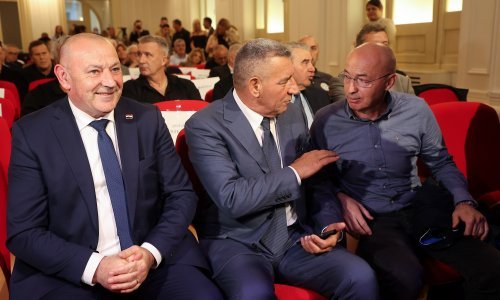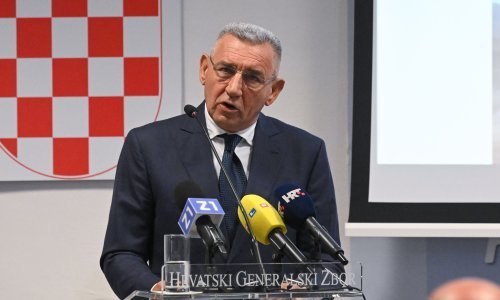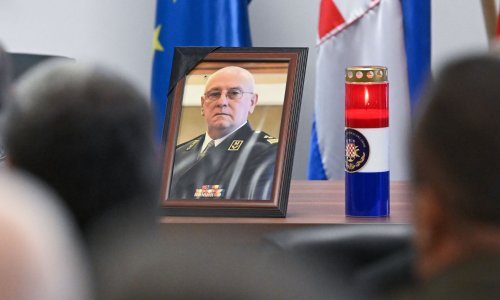The Appeals Chamber of the International Criminal Tribunal for the former Yugoslavia (ICTY) in the Gotovina & Markac case said on Monday, after a day-long appeal hearing, that a verdict would be handed down soon, adding the the key point would be the reasons for the departure of the Serb population from the territory which was under their control until the 1995 Operation Storm.
The defence team representing Croatian general Ante Gotovina said at today's hearing that the Trial Chamber had arbitrarily determined a 200 metre range of error for the legality of artillery shelling and that the rule was invented so that the prosecution would not have to prove that the targets of artillery strikes were indeed civilian targets.
The defence attorneys pointed out that there had been no civilian casualties during the Croatian artillery attacks against the Serb paramilitary forces.
A total of 1,200 shells fell on four towns -- Knin, Gracac, Obrovac and Benkovac, and there were no civilian casualties or destruction of civilian buildings. If the aim was to intimidate the Serb civilians in order to drive them away from that area, it could be inferred that the Croatian army was totally incompetent, which is absurd, lawyer Payam Akhavan said.
The defence lawyers said that if the Appeals Chamber dismissed the 200 metre rule it should also dismiss the defined artillery impact sites.
Prosecutors at today's appeal hearing said that the transcripts of a meeting held on the northern Adriatic island of Brijuni on July 31, 1995 proved the intent of the Croatian political and military leadership to drive Serb civilians out of Croatia, even if the Appeals Chamber should decide that Croatian artillery attacks during Operation Storm in the summer of 1995 were not illegal.
The prosecution said that entire towns were targets of shelling attacks ordered by General Gotovina, noting that the towns were civilian targets in themselves even though there were military targets there. They said that therefore it was not crucial what the margin of error would be in determining the legality of the artillery shelling. For them, Operation Storm was not a military offensive that brought about undesired consequences, but an attack aimed at deporting the civilian population.
When asked by Presiding Judge Theodor Meron about the defence claim that there had been no civilian casualties during the shelling, the prosecution said that there was no need to prove that there had been civilian casualties because several witnesses said during the trial that they had seen dead bodies and wounded people in the streets of Knin.
The prosecution said that the residents of Knin had left the town because of indiscriminate shelling, adding that there had been 15,000 people in the town on August 4, 1995, when Operation Storm was launched, while on August 5 only 1,000 had remained.
The prosecution also said that Croatian President Franjo Tudjman, speaking after Operation Storm, had praised the efficiency in fulfilling the goal of deporting the Serb population.
The defence team for General Mladen Markac said at today's appeal hearing that a conclusion on the existence of a joint criminal enterprise aimed at the persecution of the Serb population could not be drawn from the transcripts of the Brijuni meeting.
If we read the transcripts of the Brijuni meeting we will see that there is no joint criminal enterprise there. Isn't it unusual that nobody found a witness to confirm that, Markac's attorney John Jones said.
Markac's deference team claim that if there had been no illegal attack, their client could not have taken part in it, which he is accused of.
Jones said that all conclusions from the trial chamber's verdict about the persecution of civilians were based on the conclusion on the illegal shelling, stressing that if there had been no illegal shelling, there had not been a joint criminal enterprise either.
Without illegal shelling the entire verdict is groundless, Jones said.
Markac's attorneys said there was no reason not to trust the sincerity of the invitation the then Croatian president Franjo Tudjman extended to local Serbs not to leave their homes.
The prosecution disagreed, stressing that the Trial chamber made the right decision when it concluded that the military operation was carried out to expel the Serb population and that towns were non-selectively shelled in order to intimidate the population.
Gotovina and Markac addressed the Appeals Chamber at the end of today's hearing, stressing they were not guilty of the charges against them, adding they expected the tribunal to be guided by the facts.
At the end of the appeals hearing, the defendants spoke for the first time about their role. Gotovina addressed the tribunal in French. He said that during the war he carried out a number of difficult duties and that he always tried to preserve human lives whenever that was possible. He expressed regret about being on the run from the ICTY.
I am the first one to regret that, he said.
Gotovina told the judges he expected nothing more than what his lawyers had asked.
Markac stressed he was no war criminal or a member of a joint criminal enterprise. "I did not commit or plan crimes, this is not in accordance with my beliefs. As a human being and a humanist I expect you to carefully study the material and deliver a just verdict, Markac said.


































